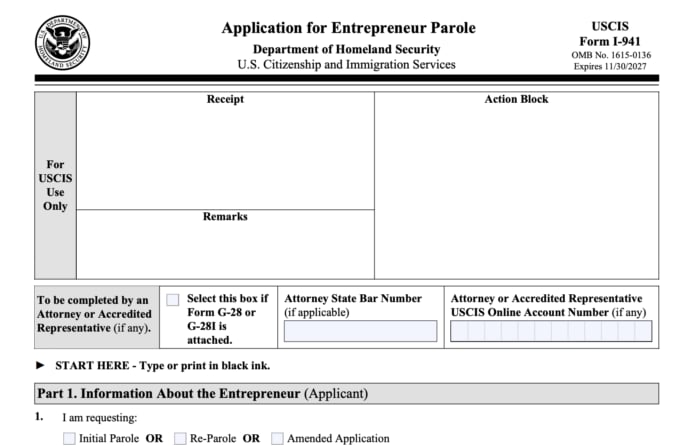Form I-941, Explained
Everything foreign startup founders need to know about applying for U.S. entrepreneur parole
If you’re a foreign entrepreneur looking to grow your startup in the United States, Form I-941 may be your ticket in. This application allows certain startup founders to request parole — a temporary stay in the U.S. — to develop and scale their business.
This guide covers everything you need to know about Form I-941, including eligibility, filing costs, timelines, required documents, and frequently asked questions.
What is Form I-941?
Form I-941, officially known as the “Application for Entrepreneur Parole,” is used by foreign entrepreneurs to request entry into the U.S. under the International Entrepreneur Rule (IER). This rule allows eligible startup founders to live and work in the U.S. for up to 30 months — with the possibility of renewal — if their startup shows strong potential for rapid growth and job creation.
Unlike a visa, parole does not confer legal status. However, it does allow you to stay in the U.S. temporarily and work for your startup.

What is Entrepreneur Parole Used For?
Entrepreneur parole gives foreign startup founders the opportunity to:
- Bring certain family members, like a spouse or children, with them
- Live in the U.S. to oversee and grow their business
- Work legally for the startup they founded
- Seek an extension of stay if the business continues to show progress
Who is Eligible?
To qualify for entrepreneur parole, you must meet these criteria:
- Startup Ownership: You must have at least a 10% ownership stake in a U.S.-based startup.
- Active Role: You must play a central and active role in the startup’s operations.
- Startup Age: The startup must have been formed in the U.S. within the past five years.
- Funding or Potential: Your startup must have received:
- At least $264,147 from qualified U.S. investors (such as venture capital firms or angel investors), or
- At least $105,659 in government grants or awards, or
How Much Does Form I-941 Cost?
The filing fee for Form I-941 is 1,200. Spouses and unmarried children under 21 can apply to join the entrepreneur in the U.S. by filing Form I-131 by mail, with a $630 fee per family member.
How long does Form I-941 take to process?
U.S. Citizenship and Immigration Services (USCIS) does not publish official processing times for Form I-941, and timelines can vary widely. Unlike other immigration forms, entrepreneur parole applications are reviewed on a case-by-case basis, and there’s currently no standard timeframe listed on the USCIS website.
Based on reports from immigration attorneys and past applicants, you can generally expect:
- 3–6 months in straightforward cases
- 6–12+ months if your case is more complex or if USCIS is experiencing delays
Premium processing (15-day expedited service) is not available for this form.
Required Supporting Documents
You’ll need to submit documents that prove you meet the eligibility criteria, including:
- Proof that the startup has potential for growth (e.g., press coverage, revenue data, letters from investors or customers)
- Proof of your ownership stake in the startup (e.g., stock certificates, cap table)
- Articles of incorporation and other formation documents
- Investment or grant documentation, such as:
- Term sheets or signed investment agreements
- Bank statements showing funds received
- Grant award letters from federal, state, or local U.S. government agencies
- Evidence of your role in the company (e.g., job title, business plan, organizational chart)
FAQS
No. Entrepreneur parole does not directly lead to a green card. However, some entrepreneurs may later qualify for other employment-based green card categories.
No. If granted parole, you can only work for the startup listed in your Form I-941 application.
Yes. You may request a re-parole (extension) for an additional 30 months if your startup continues to demonstrate significant public benefit.
Yes. If each founder meets the eligibility requirements, they can each submit a separate Form I-941 application for the same startup. Each application is reviewed independently.